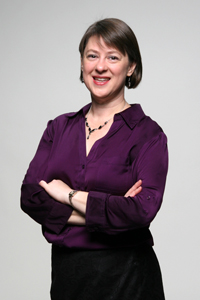About Rebecca Frost Davis
Rebecca Frost Davis, joined St. Edward’s University in Austin, TX, in July 2013 as Director of Instructional and Emerging Technology, where she provides leadership in the development of institutional vision with respect to the use of technology in pursuit of the university’s educational mission and collaborates with offices across campus to create and execute strategies to realize that vision. Instructional Technology helps faculty transform and adapt new digital methods in teaching and research to advance the essential learning outcomes of liberal education.
Dr. Davis has participated in national projects to define the place of the digital in higher education. She was a member of the digital working group of the “General Education Maps and Markers” (GEMS) project of the Association of American Colleges and Universities (AAC&U). This project defined design principles for a general education that was equity-minded and digitally informed. Members of the digital working group shared their work at the 2015 AAC&U Annual Meeting in a featured session, “Liberal Education Unbound: The Life of Signature Student Work in the Emerging Digital Learning Environment,” and Dr. Davis served on the faculty of the 2015 AAC&U Institute on Integrative Learning and the Departments, leading sessions on “Engaged Learning in Digital Culture,” “Designing for Agency” and “New Faculty Roles” in the emerging digital ecosystem.
Dr. Davis has explored the issue of access to technology both in the context of higher education, with the GEMs group, and also as a member of the group that created the Strategic Plan for Digital Inclusion for the City of Austin, the first such plan in the country. She now serves on the steering committee for that strategic plan. As the plan’s website explains, “The City of Austin’s 2014 Digital Inclusion Strategy is a dynamic plan to utilize community assets to overcome barriers, ensuring all residents have access to the skills and devices necessary to engage in our digital society.”
To support the mission of retraining faculty to teach in the emerging digital ecosystem, Dr. Davis is one of four co-editors of Digital Pedagogy in the Humanities: Models, Concepts, and Experiments, a collaborative project in development and under contract with the MLA which explores how changes wrought by new digital methods on scholarship are impacting the humanities classroom. She has taught numerous workshops on teaching with technology for faculty, technologists, and librarians at liberal arts colleges, planned conferences, and consulted on digital teaching, the teaching of writing with technology, classical studies, intercampus teaching, and virtual collaboration. Dr. Davis also helped coordinate the Sunoikisis virtual department of classics, including supporting intercampus courses and a three-year longitudinal study of Sunoikisis.
Dr. Davis works to build networks to transform learning, specifically in digital humanities and at liberal arts colleges, but also more generally in higher education. As a fellow for the National Institute for Technology in Liberal Education (NITLE), Dr. Davis researched intercampus teaching at liberal arts colleges and the role of networked courses in preparing students to live and work in a globally networked world. She likewise promotes collaboration in the digital humanities community. In “Divided and Conquered: How Multivarious Isolation Is Suppressing Digital Humanities Scholarship,” Dr. Davis and Quinn Dombrowski identify isolation as a chief challenge for humanities scholarship. With a group of digital humanists, she established DHCommons, a hub to help humanities projects and collaborators find each other.
Dr. Davis is a member of the Association of Computers and the Humanities, an associate member of the Association of American Colleges and Universities, a member of the Modern Language Association, and a member of the newly-formed Digital Classics Association. She has reviewed grant applications for the National Endowment for the Humanities and conference proposals for EDUCAUSE and the Alliance of Digital Humanities Organizations, and also took part in workshops on Building Effective Virtual Organizations sponsored by the National Science Foundation Office of Cyberinfrastructure. Dr. Davis is past president of the Theta of Texas chapter of Phi Beta Kappa at Southwestern University.
Previously, Dr. Davis served as Program Officer for the Humanities at NITLE, where she led NITLE’s initiative in Digital Humanities. Its goal was two-fold: to advance the development of digital humanities at liberal arts colleges and promote the valuable contributions these colleges make to and within the broader digital humanities movement. With her colleague Bryan Alexander, NITLE Senior Fellow, Dr. Davis documented the beginnings of the explosion of digital humanities at small liberal arts colleges in “Should Liberal Arts Campuses Do Digital Humanities? Process and Products in the Small College World” in Debates in the Digital Humanities, edited by Matthew K. Gold. University of Minnesota Press, 2012. They argue that small liberal arts colleges should indeed engage in the digital humanities and that this engagement is characterized with a strong focus on the process of doing digital humanities rather than digital scholarly products created by that process. Her ongoing research in this area includes the 2012-2013 “NITLE Survey on Digital Humanities at Small Liberal Arts Colleges.”
Prior to joining NITLE, Dr. Davis served as assistant director for instructional technology at the Associated Colleges of the South Technology Center and as assistant professor of classical studies at Rhodes College, Denison University and Sewanee: The University of the South.
Dr. Davis holds a Ph.D. and M.A. in classical studies from the University of Pennsylvania and a B.A. degree (summa cum laude) in classical studies and Russian from Vanderbilt University.
To learn more, feel free to contact her:
Phone: (512) 637-1949
E-mail: rebeccadATstedwards.edu
Twitter: @FrostDavis

[…] it in a previous post. Now let me introduce you to someone who is an expert in this topic. Rebecca Frost Davis at St. Edwards University in Texas and was a NITLE fellow on Digital Humanities and introduces the […]